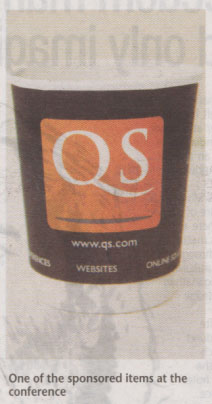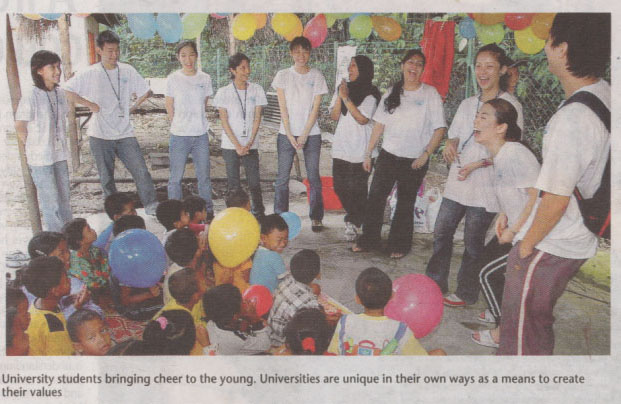Ranking - a running debate
Professor Tan Sri Dato' Dzulkifli Abd Razak
Learning Curve : Perspective
New Sunday Times - 03/20/2011
LAST week, I was privileged to be on the same side as Professor Malcolm Grant, president and provost of University College, London, in a debate on the subject International World Ranking -- Where Do You Stand? at the Going Global 2011 conference in Hong Kong.
Our opponents were two high-profiled rankers, at least to Malaysians, namely the combined Times Higher Education (THE) and QS team.
Learning Curve : Perspective
New Sunday Times - 03/20/2011
LAST week, I was privileged to be on the same side as Professor Malcolm Grant, president and provost of University College, London, in a debate on the subject International World Ranking -- Where Do You Stand? at the Going Global 2011 conference in Hong Kong.
Our opponents were two high-profiled rankers, at least to Malaysians, namely the combined Times Higher Education (THE) and QS team.

We were the obvious underdogs, given that all attendees were supplied with a THE magazine in their conference bags while paper cups at each coffee break were sponsored by QS. Moreover, QS started promoting its next meeting even before the event.
I thought to myself it was unfair, but then reasoned that ranking is not about being "fair". Although this added to the pressure of being underdogs, it was also comforting at the same time since we could only win against the juggernauts!
The conference organised by the British Council attracted more than 1,000 participants from over 60 countries. The previous event was in London, and this is the first time it really went global! It provided a good platform for discussions on higher education.

The debate started with an electronic voting among the audience. Needless to say the "yea" vote got the upper hand of about 64 per cent - that is, ranking is "useful" to the stakeholders - and the rest (36 per cent) were "nay" votes!
The rankers trotted out well-rehearsed "advertorials" (as Grant called them) as they argued their case and for a "buy-in". It appeared a little awkward because the THE and QS team used to be known as "THES-QS" not too long ago.
After barely a few years, they parted, citing some fundamental disagreement and "flaws" allegedly in the way the THES-QS methodology was constructed and applied.
The confession was made public by the same THE speaker during the previous Going Global conference in London where I was fortunate to hear it first-hand. I reported this in this column (Learning Curve, April 11, 2010). In many ways, it was a strong indication that all was not well even among the so-called "rankers".
Grant questioned the opponents' argument by listing eight points that queried the validity of the ranking exercise. His views are well known as The Guardian (Sept 21, 2010) had published some of them. He was also highlighted in this column as saying that the world ranking of universities is "worthless" and "pointless". During the debate, he convincingly brought this argument home, emphasising that the issue of values (which is not as easily measured) was not dealt with in the ranking exercise. This made ranking deficient in many ways.
On my part, speaking before Grant, I presented the viewpoint that the clichéd "international world ranking" is ambiguous given that the world is not at all "flat".
Instead the world is asymmetrical in almost every dimension, making any exercise to stack one over the other dubious.
To insist on making comparison - when there is a dire lack of a singular monolithic basis - will, at best, result in an oversimplification that gravely distorts the situation. It misses the core idea that universities are unique in their own ways as a mean to create their values.
That such uniqueness is often subtle, puts into question the validity of rankings based on limited tangible data and information. In other words, no so-called "international world ranking" is justified under the circumstances.
At the end of the session, another voting was conducted. It turned out to be a pleasant surprise when the percentages of "nay" - that is, ranking is not "useful" - were in our favour, notched up by as much as 7 per cent to 43. It was sufficient to illustrate that if the public better understands what ranking entails, especially when driven by commercial concerns, their perception can be totally reversed.
As one of the underdogs, I am convinced if we were given the same latitudes to sponsor coffee cups and place our publication materials in the conference bags, the results will be even more remarkable.
Meanwhile, perhaps it would be fun to conduct a similar debate on the home front between those who are rankings-averse and those who are said to be rankings-crazy!
* The writer is the Vice-Chancellor of Universiti Sains Malaysia. He can be contacted at vc@usm.my
